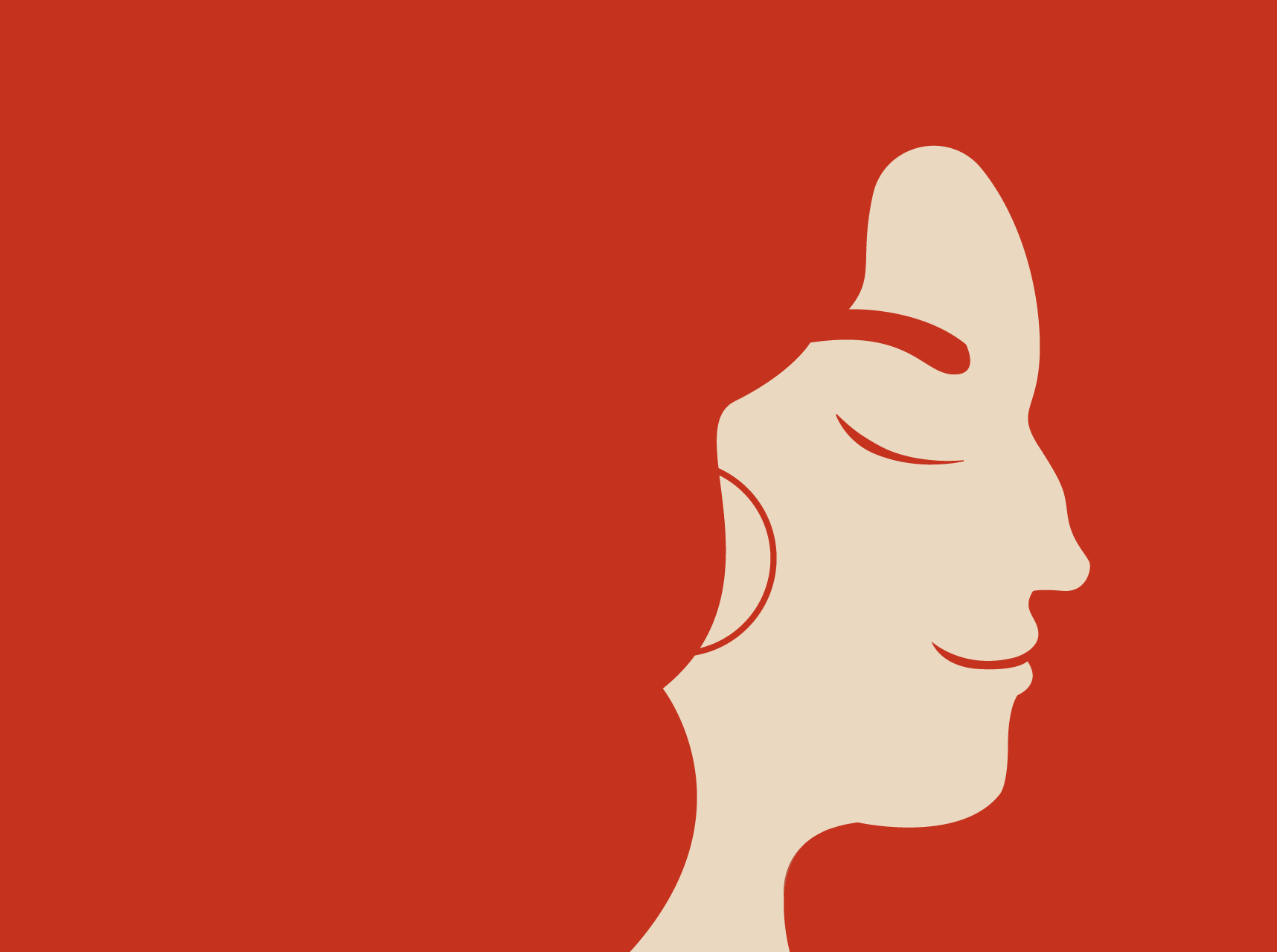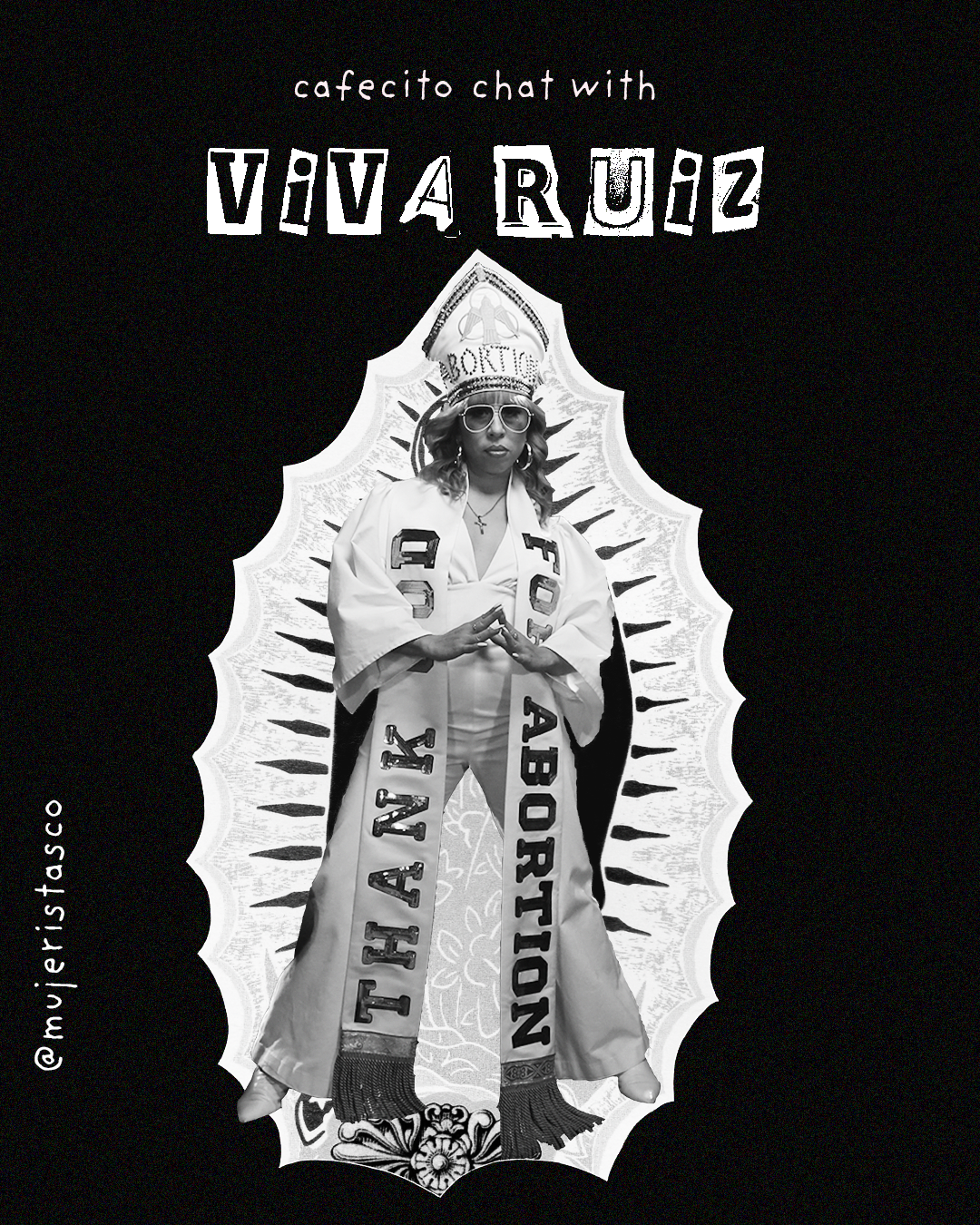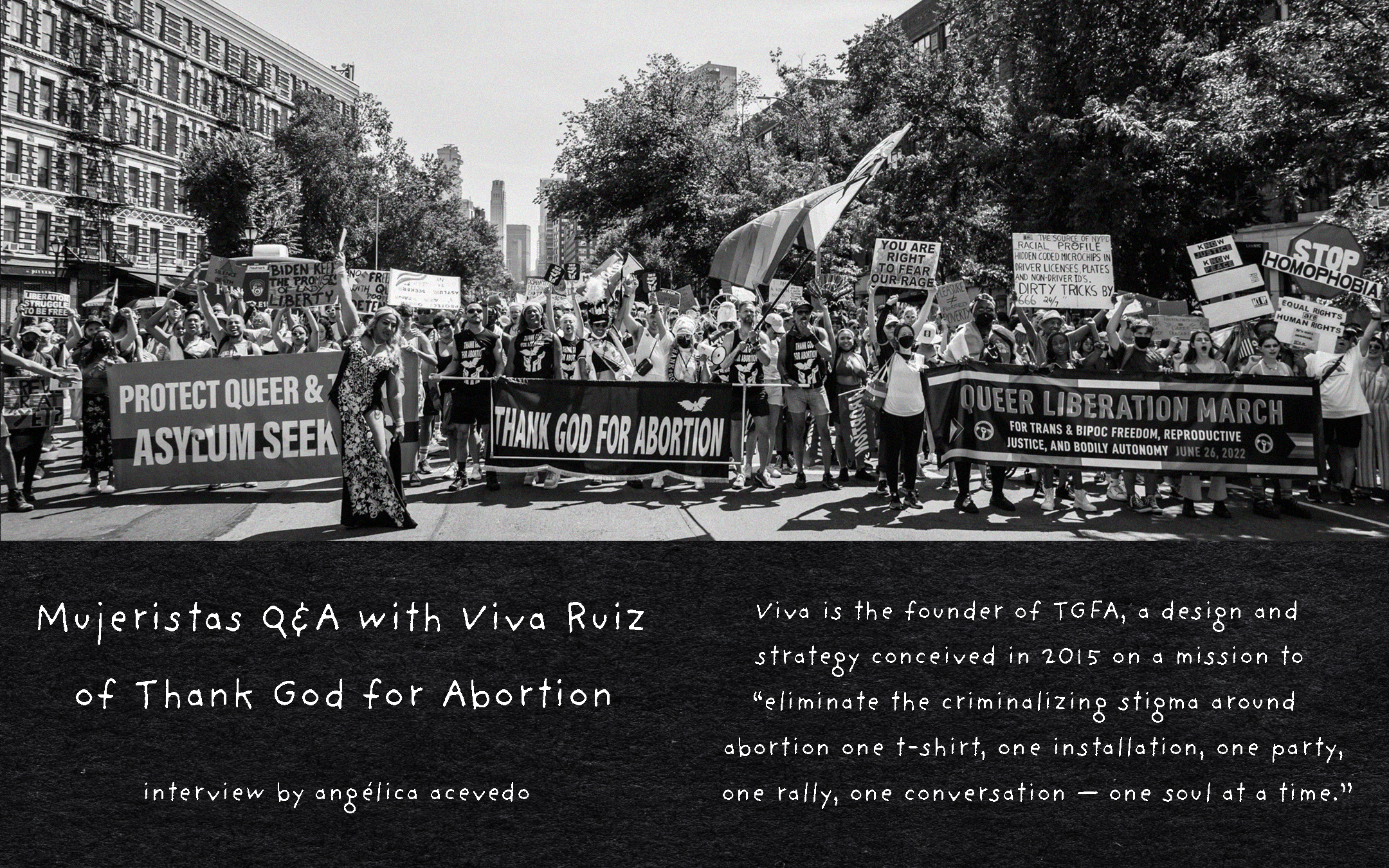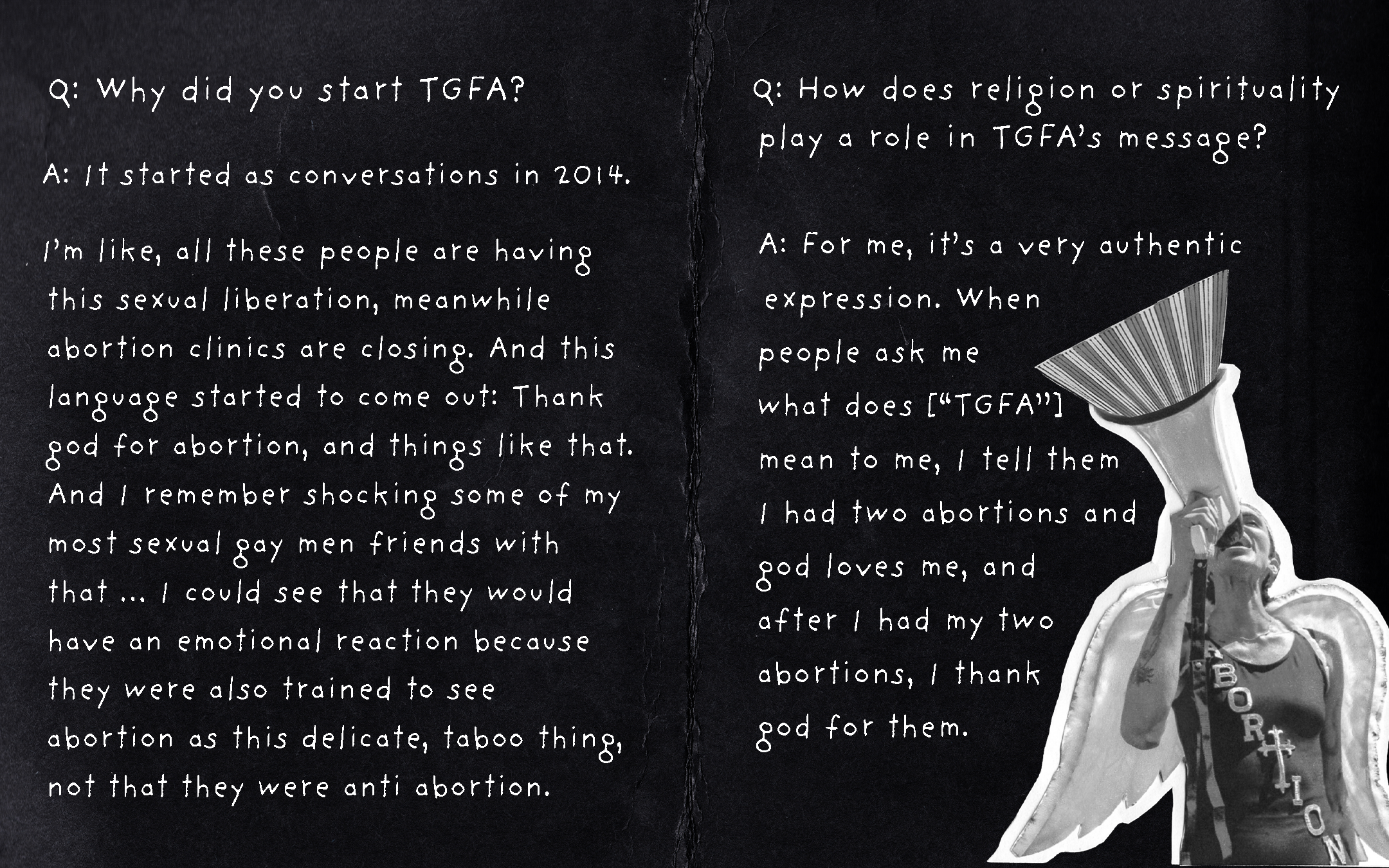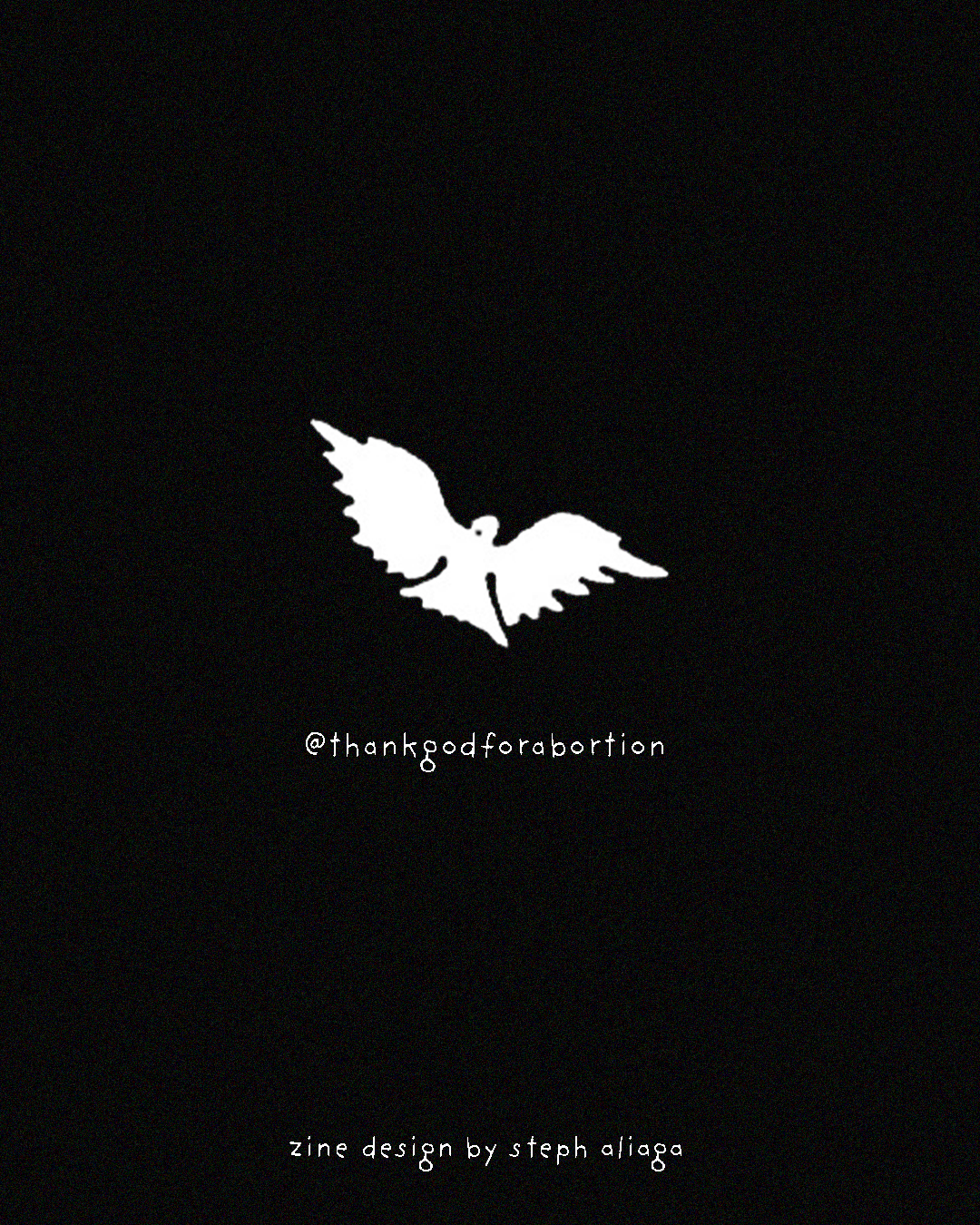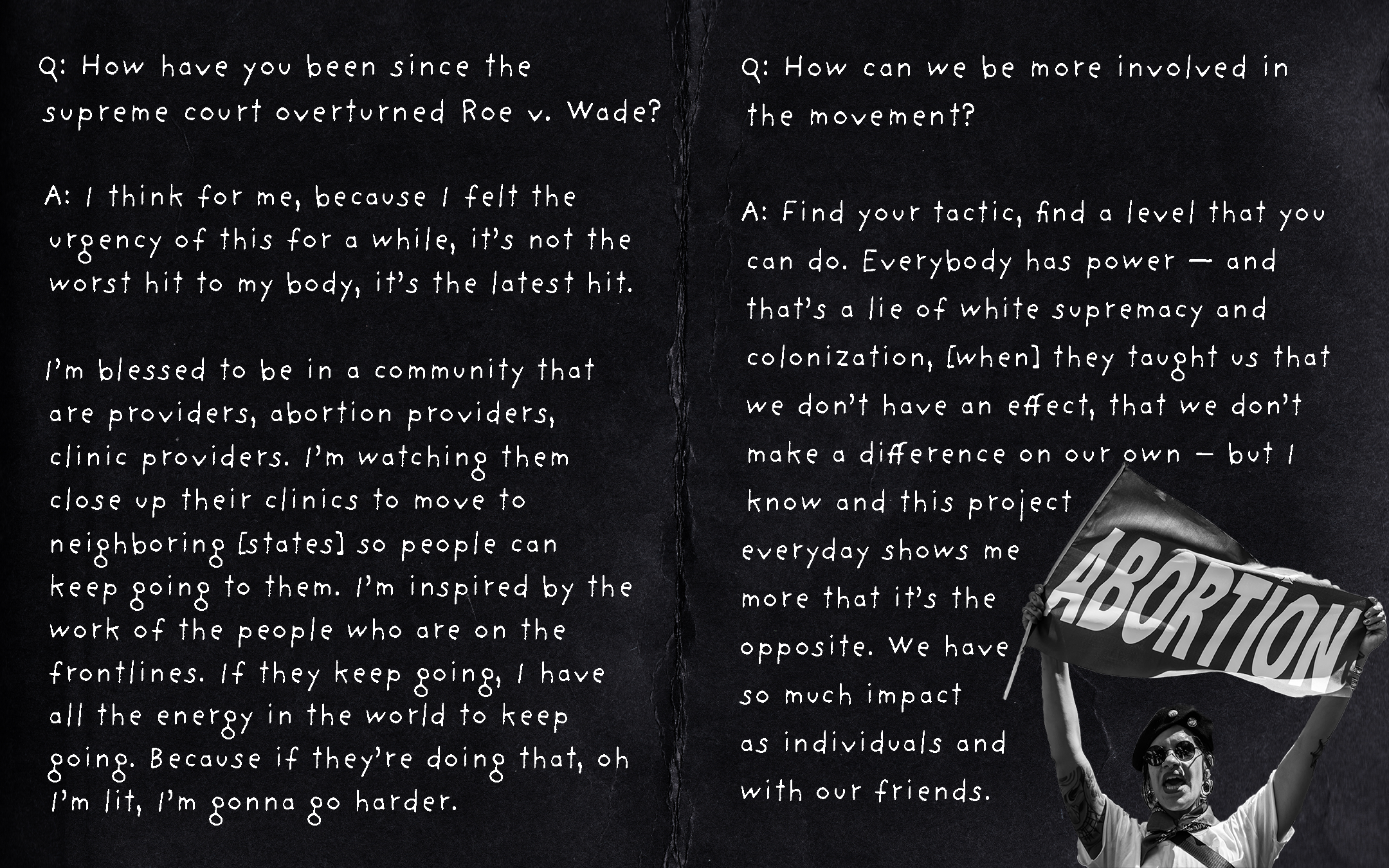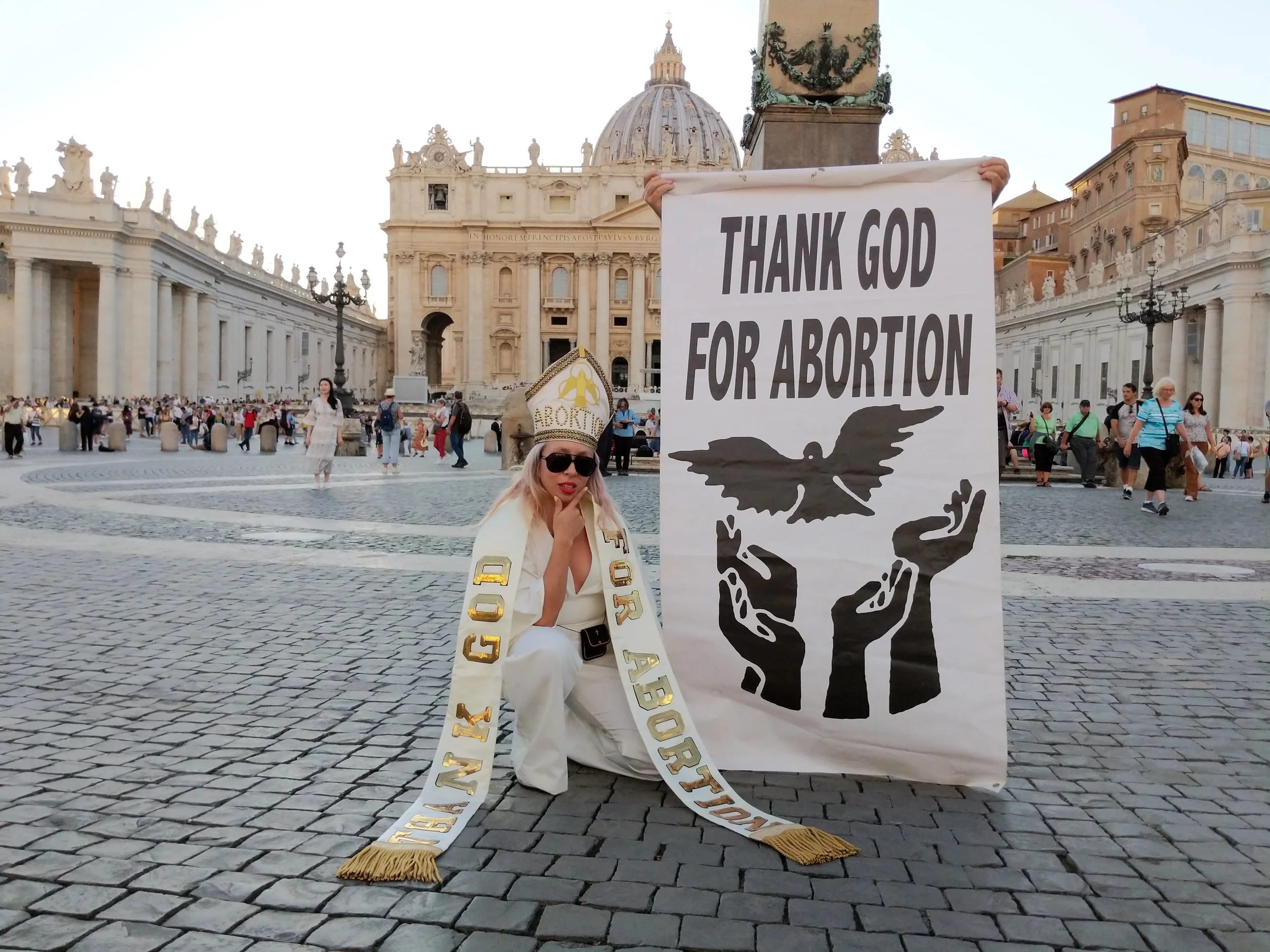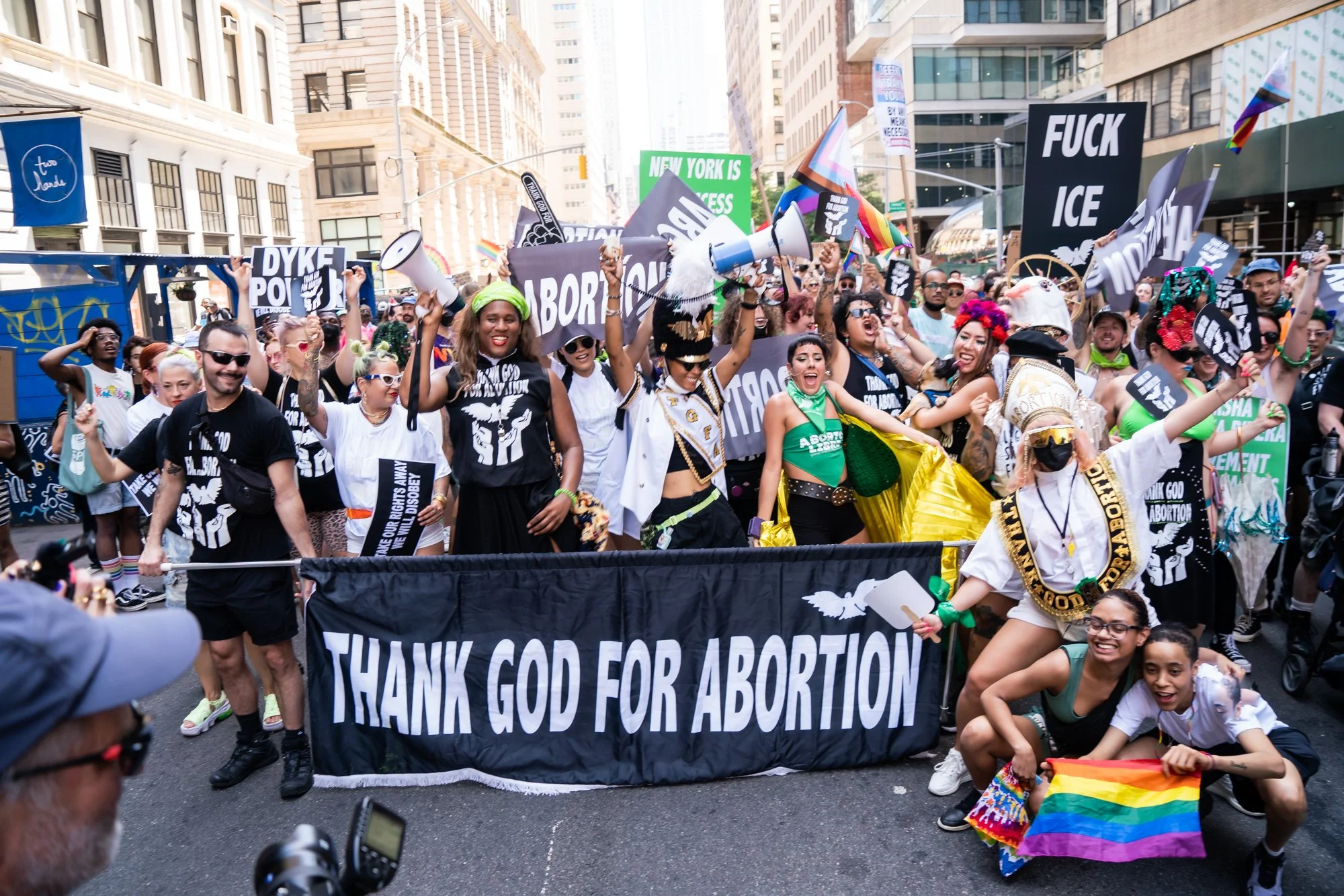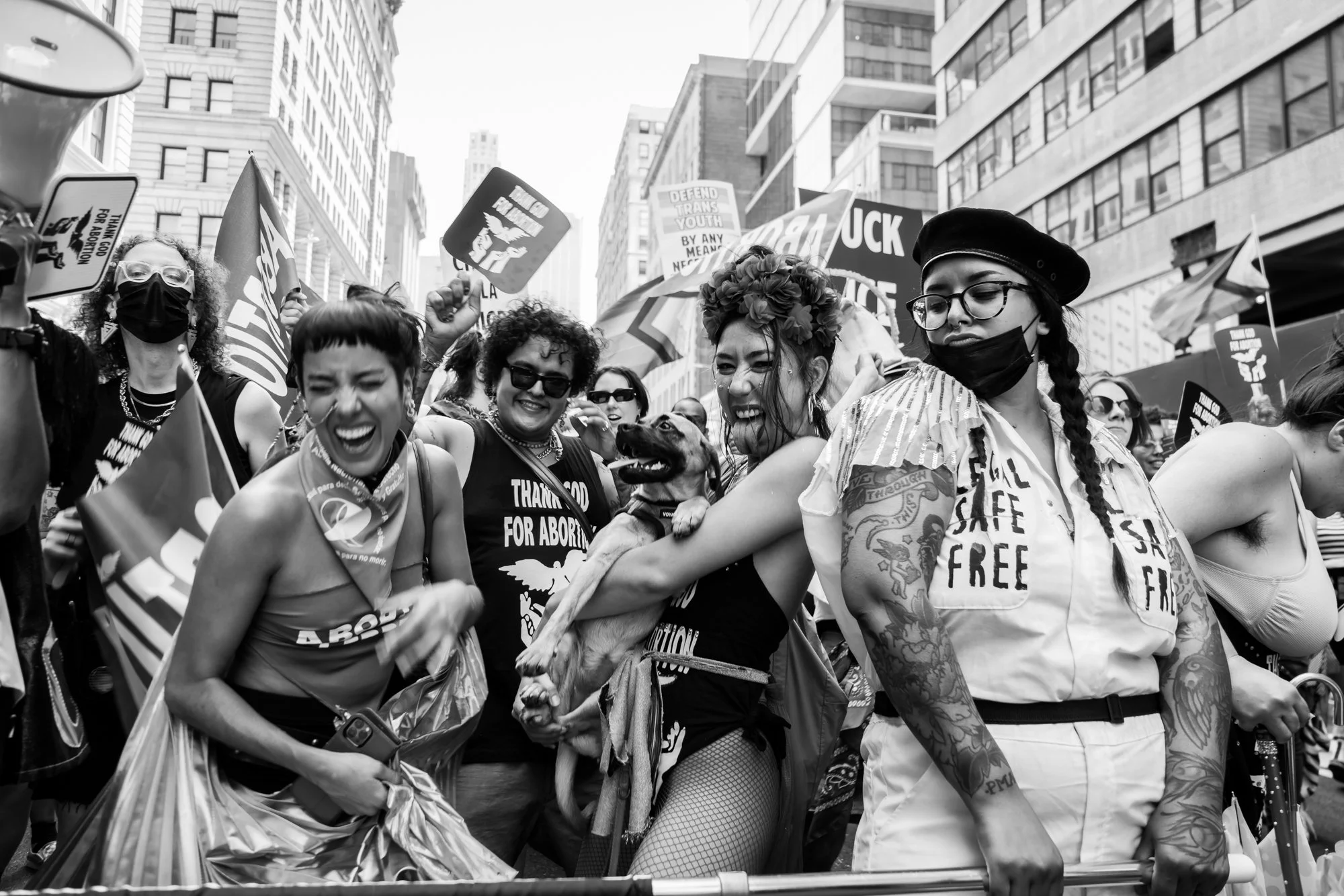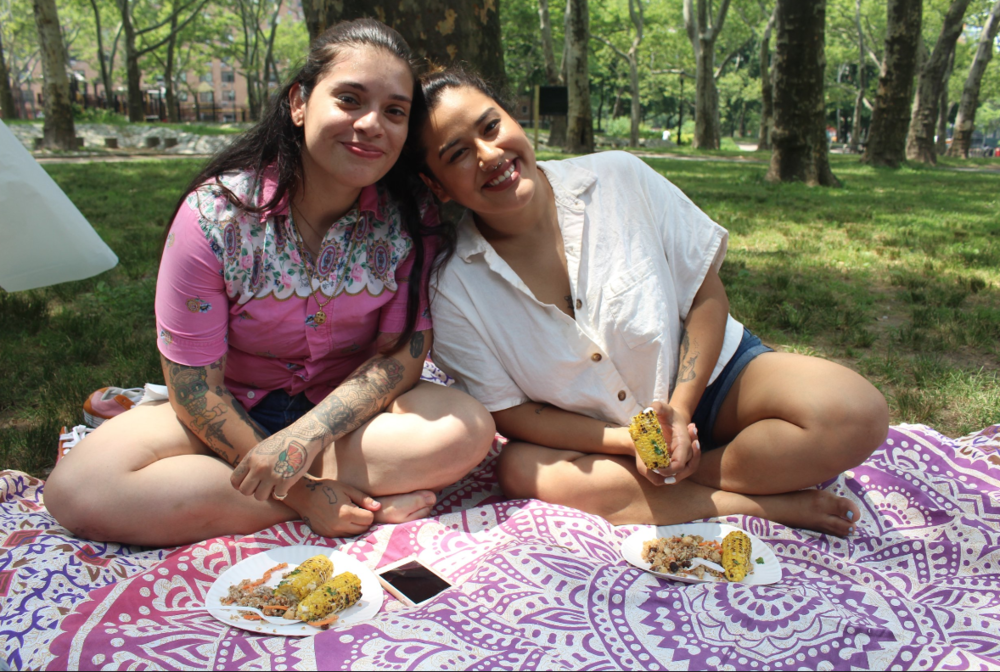Meet Viva Ruiz: Founder of Thank God for Abortion
Interview by Angélica Acevedo
Viva Ruiz is the founder of Thank God for Abortion, a design and strategy conceived in 2015.
Here’s our Cafecito Chat:
*This has been edited for clarity and length.
Q: Tell us about yourself!
A: I grew up in Jamaica, Queens and Ecuador. Queens is my heart, it formed me. I really give thanks to be from a place like Jamaica, Queens, where we had so many people of all different countries, and we all asked each other where we were from… it didn’t matter that we were born in the U.S. We assumed we were born here, but we were from other places.
I’m a Gemini sun, Cancer rising and Aquarius moon!
Q: Why did you start Thank God for Abortion (TGFA)?
A: The project has many different people, it’s like a wild organism. It’s very fluid. It started as conversations in 2014 … because in my circles, a lot of cis women, friends of mine, were having kids and pressuring me [and] being like, “you're gonna regret not having kids.” I was in a relationship that could have happened, and that person wanted kids and I just didn't, it was not my calling. And people were really shocked around me. People were feeling their biological clocks, and I just never really had that fucking clock going for myself.
Conversely, just being very aware of the trap laws, and how clinics were closing already. The right wing was already very successful with trapping these clinics with these made up rules … and it was in the news, but there really wasn't a big deal about it, and that was strange.
I'm a queer person [and] I come from nightlife, and I always had cis men, gay men family, and at the time, I remember talking to some of my closest friends who were having a lot of sex … and I just really felt that burn of like … we don't have sexual liberation if abortion isn't an option.
All these people are having this sexual liberation, meanwhile abortion clinics are closing, and this language started to come out: Thank god for abortion, and things like that. And I remember shocking some of my most sexual gay men friends with that, and I was like, what's up with that? I could see that they would have an emotional reaction because they were also trained to see abortion as this delicate, taboo thing, not that they were anti abortion.
So, it came from my friends, this project. I know the right wants to kill us … But it was feeling betrayed by my friends, really.
Q: How would you describe the work that TGFA does?
A: My first goal was to infiltrate consciousness, basically. I wanted to create images and language that I'm not seeing. And I really doubted myself, because it felt very dangerous. And it felt like trouble. I'm a very spiritual person, and I remember praying. I was like, “do I really want to do this? Like, this is a lot, even for me.” And I really heard it, like, “Yeah, this is what we're doing right now.”
So I didn't really have a lot of ambition with it, but I made these designs and a friend of mine was having a market, and she encouraged me to put it on a t-shirt for her market, and as soon as I made the screen, it was like a scandal. It was a scandal at the screen printing place, it was a scandal everywhere I went with it.
It was just such a thing around the most lefty people possible. So that just encouraged me a day at a time to just keep going. I also call it a technology that kind of manifests in different ways. People wear it and they have their own experiences with it.
I do performances and direct actions that are like parties on the streets. From my culture, we didn't have a lot of money, but we had music, food, dancing … we have our gatherings in the living room where we connect, and that's so important. That’s what’s at the center of TGFA, my family and how we connect in the music and the food and joy. When we’re on the streets, it’s like family. It’s a salsa party in the living room vibe.
Photo courtesy of Thank God for Abortion and Jazzmine Beaulieu
Q: How does religion or spirituality play a role in TGFA’s message?
A: My family being from Ecuador and not having people here and [then] being in a very immigrant-heavy neighborhood here, church is very fucking important if you were going to church in your homeland. That’s a place where you connect with your language, with your faith, with other immigrant people. We went to church all the time. But I really got the God part … the unconditional love. Growing up, there was a lot of drugs on the streets, a lot of domestic abuse, and a thing like church can seem super real and necessary and you want that protection. I wanted to be a nun! But of course later as my queerness, as my political me emerged, I was more like fuck the church, there’s so many terrible things about it — but I never stopped being a spiritual person.
I had a reconciliation with the Catholic church at some point, not that I identify with it. I just remembered … people need faith, something to believe in when things are really terrible. As we see in Black radical tradition, the church is very central to the civil rights movement, Malcolm X and Islam, MLK and Christianity — radical people have leaned on faith. So with abortion, partly with my rage at people being shocked that I was being like “thank God for abortion,” I was like fuck that I’m going harder with God and abortion.
This put me in touch with a lot of people who have abortions, and a lot of them are faithful people and they feel terrible about themselves because they’ve been taught that they’re going to hell or they’ve been taught that they’re committing a sin or killing something. So it’s been very, very beautiful.
Because of abortion, I dustesd off my Catholic membership card — I have all the indoctrinations, they taught me the bible, I have all this education that I can use now. If you’re Catholic and you love Jesus, then aboriton must be fine with you, that’s how I see that. If you believe in Jesus Christ, then you must believe in abortion, that’s how that breaks down. Because the teachings of Jesus Christ are compassion, nonjudgement, uplifting poor people and marginlized people, so from what I learned — because I did many years of Catholic school — abortion is very consistent with Jesus’ teachings.
And as a person who believes in the spirits, I can say that if God is everything, then God is everything, including the decisions I made to have two abortions. I went into that with spirit, with god, and I tell people I was loved more not less by the spirit, by God.
When I share that with people, it’s very beautiful, it’s very powerful, because I'm not judging them for their beliefs. And that’s a mistake a lot of white feminists have made, because they’re disconnected from that kind of belief system, [from what] I’ve encountered. They’ve literally laughed at me, like “God had nothing to do with this, women won this.” And I’m like shut the fuck up, I know people did this, but that’s their attitude toward God. And I get it, I know the church is evil, I know institutions are evil, but how are you going to try to remove barriers for people who need aboritons and then be the person who judges them and think they’re stupid for believing in God? These white leftists feminists are out here judging people, creating barriers. It’s very white supremacist and very classist to only make fun of God. It’s not helping.
The project, the t-shirt, it works whether or not people see it my way. If people wanna use it to just provoke people, that’s fine because I’m happy to troll fascists, that’s successful, and they lose their minds! So it's fine that we take up space with God. But for me, it’s a very authentic expression.
When people ask me what does that mean to me, I tell them I had two abortions and god loves me, and after I had my two abortions, I thank god for them.
Q: What other artwork do you do?
A: I always wanted to be a dancer but I never thought I could be because I didn’t have role models, I didn’t know people who were artists — everybody was though, secretly. I did strip arts and go go dancing for a long time. I made these queer telenovelas, I made like five of them.
I make music too! I was a punk-rock kid, everything was self-taught, and I started doing vocals later. Kind of immediately I made a reggaeton anthem for TGFA. I had an artist in residency with Shout Your Abortion in 2019, and I made a music video for the anthem, so that came out in 2020. I wanted to make something that could sit next to a regular reggaeton music video. I directed that video, and the people who are in it are people who would march with us, my cousin’s in it, my sister’s in it, it’s all fam.
Living is an art, conversations are art.
I’m an artist in organizing. I create ecstatic places, something I started to name, because I make parties … there’s an art to that.
I love it because I want to be useful, because if I’m not useful I get hopeless. You know, things are very bad.
Q: Right, unfortunately. That brings me to checking in on how you’ve been since the supreme court overturned Roe v. Wade?
A: I think for me, because I felt the urgency of this for a while, it’s not the worst hit to my body, it’s the latest hit. Especially for Black women, Black people, Brown people, immigrant people, it’s been a nightmare, we’re not new to this.
I think about ICE, who have been so brutal to so many undocumented people, like pulling them out of their jobs, separating them from their children… The kind of trauma to our communities has been going on. Roe w. Wade is terrible, but it’s been terrible.
When you’re in it for the long haul, something this terrible doesn’t decimate you because you’ve been at it. It’s incredibly devastating. It’s so sad that people in a whole state like Texas… now are in this awful place where they have to escape that state to find the care, and not everybody will be able to. And what that does to poor people the most, Black people the most, Brown people the most, Indigenous people the most — it breaks my heart. We have our feelings but we keep going.
I’m blessed to be in a community that are providers, abortion providers, clinic providers. I’m watching them close up their clinics to move to neighboring [states] so people can keep going to them. I’m inspired by the work of the people who are doing the most and are on the frontlines. If they keep going, I have all the energy in the world to keep going. Because if they’re doing that, oh I’m lit, I’m gonna go harder.
Q: That’s so inspiring! You really are a party starter because it has felt like a very dark time. But as you said, you’ve seen this coming and so have so many reproductive justice advocates who were sounding the alarm, it just wasn’t being heard.
A: Yeah, it didn’t infiltrate and that’s a lot on who the voices and the leadership [are on this]. Here’s the thing, we need the tactics and the strategies of the people who are the most threatened because we’re going to have different strategies. The strategies of cis white people in, let’s say the left, the democrats, who are supposed to be the ones fighting for us, what the fuck are they doing?
There was this saying, “legal, safe and rare,” and it’s a bullshit message. Abortion isn’t rare and it doesn’t need to be rare. It’s an outcome as valid as having a child. It’s the same as far as morality. White people have been out here apologizing on our behalf — I don’t need their apology, we don’t need their apology.
And when we look at [reproductive] justice, lead by Black people and people of color, we’re gonna give you different tactics, we’re not gonna be here sitting around letting people apologize for us, we’re gonna have different ways of seeing our way through this. But that’s why I think it went backwards.
Q: Right. We resonate with your work because TGFA showcases different and powerful forms of art and activism to raise awareness about abortion access and reproductive rights for all people. As members of MC, we’re passionate about mujerismo and community building and we’d love to hear how you think people can be more involved in the movement.
A: I think a big thing for me in the project is to encourage people. That’s a big job. I can speak from my own experience, this is love-based.
Like the movies I’ve made were love-based, I didn’t have a budget – I had friends who I worked in their projects, they worked in my projects, so we just support each other, we’re building relationships with each other. We’re building community.
Also playing is a big part. I love to play – I’m part otter, I really need to play!
You just don’t know where your ideas are going to lead to. I thought I was going to lose my family, my friends, speaking about abortions like this – and it’s the opposite.
Even my family in Ecuador, even though they’re anti-abortion, they’re Catholic, they’re very traditional tias. I was on Facebook when this started, you know how all our families are on Facebook, I didn’t hide anything and I had to block an aunt who didn’t speak English, her white employer commented in English on my TGFA stuff about how I “needed to keep my legs closed.” But this is such a metaphor for the whole thing that over time my mom talked to my tias and they were all understanding that I’m not trying to get everybody to get an abortion, but that it was about their rights. And that taught me that I don’t have to make people think like I do, people don’t have to be pro-abortion but they need to make a distinction between their feelings and the law – like what we force people to do or force people not to do, and that they understand.
Even that aunt I blocked, when I saw her at a barbecue a few weeks later, they were like, “Viva aborto!” which was crazy and amazing! I know that they were afraid of losing me. And that’s love, I didn’t have to convince them, they know who I am. They [realized] they might lose me if they don’t try and meet me where I am. I’m sure that they’re still anti-abortion in their hearts but they respect the work and understand this is about human rights.
What you can do, is talk to people. This is a project that started from conversation and it’s about conversation. Even to upset people is valid. That’s a tactic called advocation. Advocation is better than complacency. Because if we don’t do anything, you know who’s doing something? The right, the fascists are never not working. White supremacy is 24/7. They have all the resources, they have all the energy. And I’m not saying I have to work 24/7 … because there’s actually more of us that know that abortion needs to be accessible to everybody. There is a majority, but that’s what they call a sleeping majority. So one really accessible thing that nobody needs money for is be in conversation about this with their families or their friends, and intervene if something is happening. It doesn’t even need to be abortion because it’s all interconnected – that racism, sexism, trans misogyny. Saying the word abortion is very important.
And then if people have money, where that money needs to go are independent aboriton funds because the clinics have the least amount of resources and do most of the work. There’s a fund called National Network of Abortion Funds, signing up for monthly donations is very, very important.
Yamani Hernandez, who used to be their executive director, said, “Paying for people’s abortions is a revolutionary and political act.” And that’s that on that.
What can we do? Find your tactic, find a level that you can do. Everybody has power — and that’s a lie of white supremacy and colonization, [when] they taught us that we don’t have an effect that we don’t make a difference on our own – but I know and this project everyday shows me more that it’s the opposite. We have so much impact as individuals and with our friends.
Just start and be consistent. It’s that relentless push that ends up becoming momentum.
Photo courtesy of Thank God for Abortion and Jazzmine Beaulieu
Q: So with everything going on, how do you deal with burnout?
A: That’s a good question. It’s not like I have an ethic where I wanna work all the time. I saw my dad and my mom and there’s so much sadness that comes from overworking. But it’s also a moment where I feel qualified and in a really weird way specialized to be in the landscape of what’s happening right now, and be useful. It feels good to have a purpose. Otherwise I’d feel terrible, too hopeless, but I’m very energized by being in the fabric of what everybody’s doing to make it better right now. I feel very inspired.
The ocean is my number one renewal. Also hanging out with my friends, having un cafecito and talking about what’s going on is very important with keeping everything going. I stay very connected with my friends and my family now.
Abortion funds & resources, courtesy of Viva
How to support abortion access right now:
National Network of Abortion Funds: abortionfunds.org
Keep Our Clinics: keepourclinics.org
How to stay safe online: digitaldefensefund.org
Need an abortion? ineedana.com
Abortion pill info: aidaccess.org and plancpills.org
